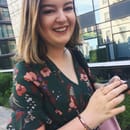Journalism is becoming a difficult career to pursue. This field is extremely competitive and requires a great deal of persistence to even acquire a career in as it is—and now Trump has stepped in. Trump has displayed a blatant distaste toward many media and news sources. From calling BuzzFeed a “failing pile of garbage,” to personally attacking The New York Times on his twitter account, to refusing to answer a CNN reporter’s question at his first press conference as president, Trump has somehow managed to vilify the media.
Journalists hold an important position in our country—to inform the people. In today’s world, it is vital that the people be aware of what is happening around the world. Kaylie Felsberg is a freshman at The New School in New York City, where she is double majoring in Journalism and Economics. While she feels the added strain that Trump is placing on journalists, she has also become fueled with an even stronger desire to make it in this profession in order to protect, and make the public aware of, the facts.
HC: What made you want to major in journalism?
KF: Journalists, to me, have the ability to shape the world and expose ongoing problems within our society. Something that should be a top priority is bringing the frontline to the western world and it is not happening enough. It’s something that I hope to do in my career.
HC: What are your hopes in terms of a potential career?
KF: A major goal of mine would be to work for The New York Times or The Economist, but you always have to start small; a good start would be The Village Voice or New York Metro. BuzzFeed would be awesome too.
HC: I know that you started to get apprehensive about following through with majoring in journalism. Why is that?
KF: Especially now it is becoming increasingly hard to be a journalist as print is “dying” and with the election the media has almost become the villain, which is not true in any way, shape or form, but it can discourage you when something you are so passionate about is seen as evil.
HC: When did you decide to stick with it and why?
KF: I decided to stick with it after the election because it became apparent to me that people are not as informed as we think they are. I think journalists are a vital part of this world and it makes me excited to be able to get out there and talk to people as to why they believe in something or not.
HC: Journalism is a tough field to make it in as it is, how has Trump made it even harder?
KF: It’s hard because he is completely discrediting journalists and all the hard work that we put in, what we do now seems useless and like it is not even needed in this day and age. However, as we’ve seen so far with him, journalism is obviously very needed to make sure people know the facts and not the opinions.
HC: What are your thoughts on Trump’s constant declarations of “fake news?”
KF: Whenever I hear him say fake news I immediately roll my eyes. Just because things are coming out against him that he doesn’t like does not mean it is “fake news,” it’s a fact. He has no thick skin, it’s almost laughable.
HC: How do you feel about Trump’s picking and choosing of news sources based on what he wants to hear?
KF: It’s incredibly upsetting because our main goal as journalists is to hold as little bias as possible; him picking and choosing isn’t helping at all – especially when it’s Fox News. Trump is blatantly picking a pretty conservative news channel that also blatantly favors him. More likely than not Fox News is going to favor him; if they didn’t we would hear about it all over his Twitter.
HC: How is Trump’s very blatant disapproval of many credible news sources harmful?
KF: For him to criticize very credible news sources such as CNN and NBC, it makes people less likely to go there to look for news. These sources rarely hold a bias and are extremely helpful in showing matter-of-fact-news. [By] discrediting the media, [he] is only going to turn more people against them in the long run.
HC: In what ways do you hope to make a difference through writing?
KF: I hope that I am able to show people the ongoing problems of the world and not be seen as “fake news.” As I said before,` my main goal is to do more of frontline journalism so bringing issues that people don’t see everyday would be especially fulfilling.

